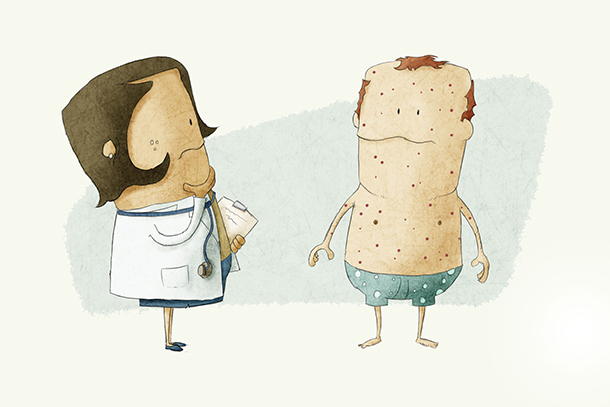Chickenpox and shingles generally won’t kill you, but for some adults, they could result in a trip to the hospital. So with a new shingles vaccine now available, should you consider vaccination to avoid chickenpox and shingles as an adult?
Physician Sharon Orrange, MD, clinical associate professor of medicine (clinician educator) at the Keck School of Medicine of USC, said the answer depends on a few factors.
What is chickenpox, exactly?
It’s an infection caused by the varicella zoster virus. In children, it’s usually a mild disease that runs its course in five to 10 days and requires no medical intervention. But in those who develop chickenpox as teens or adults, there’s a risk of complications, including pneumonia, skin infections and brain swelling.
What’s the difference between chickenpox and shingles?
Adults can develop shingles if they’ve already had chickenpox. Also called herpes zoster, shingles is a reactivation of the virus that causes chickenpox. After you recover from chickenpox, the virus doesn’t entirely disappear — it lies dormant in nerve tissue near your spinal cord and brain. When it springs into action again as a painful skin rash, that’s shingles.
This time, the pain will likely come before the rash; some people only experience the pain without any visible symptoms. Like chickenpox, shingles usually isn’t life-threatening, but it can cause complications, including neurological problems, skin infections and eye infections that lead to vision loss.
What if I’ve never had chickenpox?
“Almost everyone born before 1980 tests positive for exposure to varicella,” Orrange said. That’s why the federal Advisory Committee on Immunization Practices considers people born before 1980 immune to the varicella virus. Even if you never broke out in the telltale rash, if you’re 38 years old or older, you almost certainly have the virus lying dormant in your system.
So should I get the chickenpox vaccine or the shingles vaccine?
For most healthy people, if you’re between 30 and 50 years old, there’s no need for either vaccine, Orrange said. There are some exceptions, including health care workers, pregnant women, teachers and those who are HIV-positive. If you’re an adult who hasn’t received the vaccine or you think you’ve never been exposed to chickenpox, you can ask your primary care doctor to run a blood test called varicella titers. It shows your level of chickenpox immunity.
But if you’re 50 or older, you can and should get the new shingles vaccine, Shingrix, whether or not you remember getting chickenpox in childhood. It’s given as a shot in two doses, two to six months apart.
There’s also an older shingles vaccine called Zostavax. It’s given to those 50 and over with certain medical conditions, and to people 60 and over. Zostavax is 19 times stronger than the chickenpox vaccine. It’s unknown, by the way, whether the shingles vaccines protect against the varicella virus that would lead to chickenpox in adults who were never exposed. The makers of Shingrix or Zostavax would have to run a study on that question, Orrange said, but there’s little incentive to do so since a chickenpox vaccine already exists.
I heard that these shingles vaccinations “wear out” over time. At some point, will I stop being immune?
That’s true for Zostavax, the older vaccine. Not only did immunity wane over time, but the shot was only 50 to 64 percent effective in preventing shingles in people 50 to 70 years old, and even less effective for those over age 70, Orrange said.
What about the new Shingrix vaccine?
Shingrix is the clear vaccine of choice, Orrange said. It’s 97 percent effective at preventing shingles, and immunity is not believed to wane over time. While Zostavax contains a weakened live virus — which works especially well in helping children fight off the varicella zoster virus — Shingrix works differently. This vaccine contains a single protein that causes the immune system to recognize the varicella zoster virus. It seems to work better for older people.
What should I do if I’ve already had one outbreak of shingles or if I’ve already had the Zostavax vaccine?
“Still get Shingrix,” Orrange said.
Should I give my children the chickenpox vaccine?
Absolutely. “There is no benefit to letting your kids get chickenpox over the vaccination,” Orrange said.
Could getting the chickenpox vaccine make someone more susceptible to getting shingles later in life?
There’s no evidence that one route — vaccine versus infection — is more or less likely to lead to shingles, Orrange said.
— Connie Sommer


